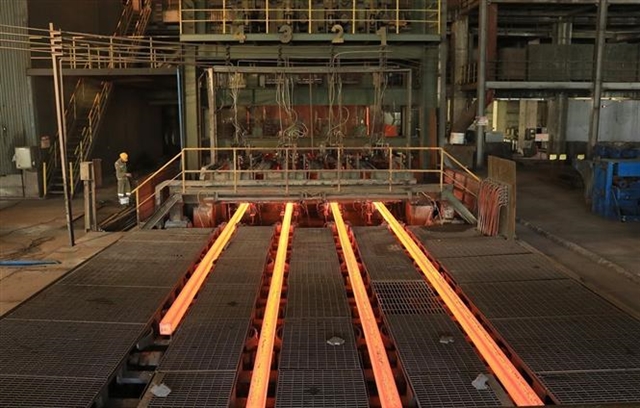The duties not only aim to level the playing field for local manufacturers, but have also instilled renewed confidence among investors.

HÀ NỘI — The recent imposition of temporary anti-dumping duties on certain hot-rolled coil (HRC) steel products imported from China is expected to have positive impacts on certain Vietnamese steel producers, according to experts.
The tariffs, announced by the Ministry of Industry and Trade of Việt Nam (MoIT) on February 21, take effect from March 8 and range up to 27.8 per cent.
The temporary measure aims to protect domestic steel manufacturers from unfair competition and is set to last for 120 days.
This move has significant implications for both the local steel industry and the broader Vietnamese stock market by reducing the influx of low-priced Chinese steel, thereby alleviating competitive pressures.
A report from VPBank Securities (VPBankS) said that the announced anti-dumping duty rate is higher than the typical price difference between Vietnamese HRC and Chinese HRC.
Generally, the selling prices of HRC from Hòa Phát Group (HPG) and Formosa (FHS) are consistently US$15-45 per tonne higher than the prices of HRC imported from China, reflecting a difference of 2.9-9 per cent compared to Chinese HRC prices.
Currently, Việt Nam's HRC production capacity stands at 8.2 million tonnes annually, primarily supplied by major players like Hòa Phát Group and Formosa Hà Tĩnh. This falls short of the national demand, which ranges between 10 and 13 million tonnes per year, according to the report.
With the new anti-dumping duty, domestic HRC consumption by companies like Hoà Phát and Formosa is likely to rise significantly.
The securities firm noted that the anticipated commencement of operations at Hòa Phát Dung Quất 2 Iron and Steel Production Complex will increase the company’s total HRC production capacity to 12.8 million tonnes annually.
On the other hand, VPBankS believes that companies reliant on imported HRC, like Hoa Sen Group and Nam Kim Steel, will face negative impacts, though they have mitigated risks by diversifying sources.
The fourth quarter of the 2024 financial report shows higher inventory values, indicating stockpiling before the anti-dumping duty announcement. Consequently, the short-term impact on the two producers is expected to be minimal, but in the long term, they will need to use domestic HRC or higher-priced imports from other sources.
In a report following the MoIT’s anti-dumping duty announcement, Vietcombank Securities (VCBS) highlighted that HPG will benefit, as Chinese steel will struggle to compete, boosting consumption at Dung Quất 2.
VCBS noted a recovery in the domestic real estate market due to government support and low interest rates, which improved domestic steel consumption in the last quarter of 2024.
Additionally, Chinese HRC exports to Việt Nam dropped to 537,000 tonnes in January, down from 800,000 to one million tonnes, which positively impacts domestic consumption.
On the export front, VCBS expects lower global interest rates to stimulate housing markets in key partners like the US, Europe and ASEAN, supporting favourable conditions for steel exports.
The securities company also believes that China's post-pandemic real estate stimulus will drive steel demand and prices higher this year.
Market response
The stock market has reacted positively to these developments.
Opening the week, the market's benchmark VN-Index surpassed the 1,300-point threshold, with steel stocks leading the surge.
Notably, shares of Hòa Phát experienced a significant uptick, with trading volumes reaching 45 million shares within the first 30 minutes of the session, amounting to a transaction value exceeding VNĐ1.28 trillion ($50.1 million).
Other steel companies, including Tiến Liên Steel Group, Việt Nam Germany Steel Pipe JSC and Việt Nam Steel Corporation, also witnessed substantial gains, with Tiến Liên Steel hitting the daily ceiling price of a 6.8 per cent increase.
Market experts attribute this bullish trend to last week’s anti-dumping duty announcement.
Đinh Quang Hinh, head of Macroeconomics and Market Strategy at VNDIRECT Securities, noted that the anti-dumping tariffs serve as a pivotal factor in positively influencing steel stocks, particularly Hoà Phát.
Similarly, Phan Dũng Khánh, head of Investment Advisory at Maybank Securities, told the Labour Newspaper that while steel stocks are poised to benefit in the short term from these tariffs, investors should consider these companies' long-term business strategies and performance when making investment decisions. — BIZHUB/VNS





